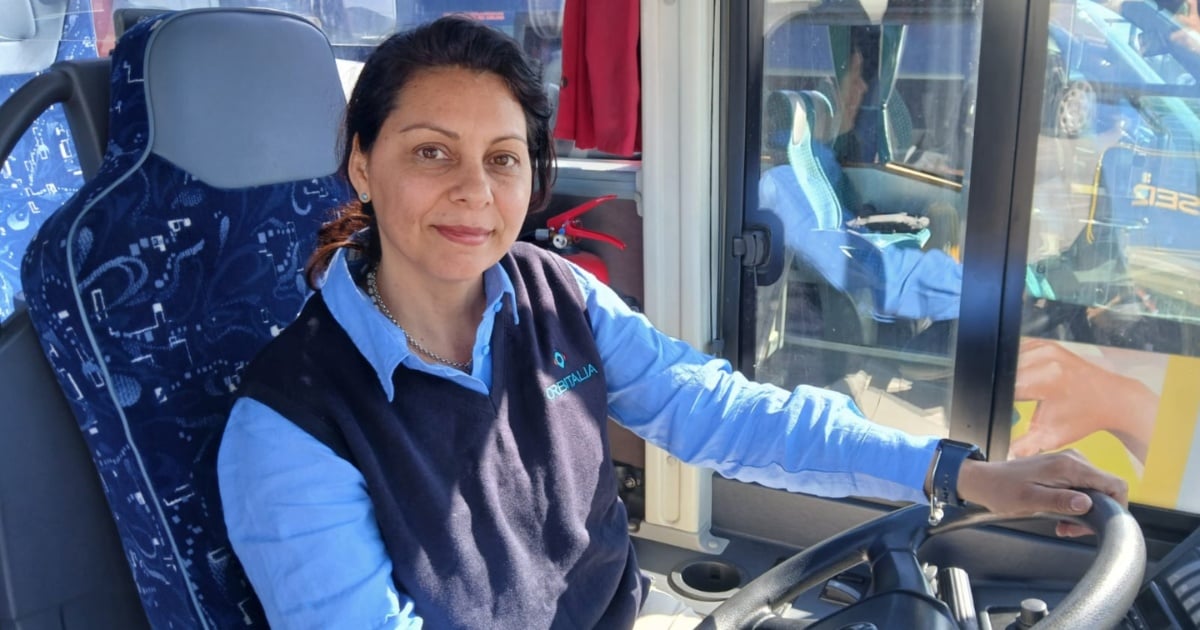Mayulis, a Cuban who emigrated to Murcia, Spain, has reinvented herself as a school bus driver despite her education on the Island as an electrical engineer.
A revealing report published by the Spanish Cadena SER demonstrates that with effort and perseverance, it is possible to move forward. Mayulis left Cuba two years ago to provide a better future for her daughter, and although she could not validate her university degree as an electrical engineer, she did not give up on her quest for success.
Through a project by Cáritas and the Regional Federation of Transport Organizations and Companies of Murcia (Froet), she obtained a driver’s license and began a new chapter in her life, now as a bus driver.
“When I heard about the project, I thought: ‘wow, because when I saw the female drivers, I thought how brave they were‘”, he told the Spanish media, adding that “he likes challenges”.
Since March, Mayulis, in her school vehicle, has been covering a route for the travel agency Orbitalia in the municipality of Lorca.
Although she started by doing various jobs to earn her living, she now feels fulfilled with her new profession. After working in restaurants and taking English courses, she decided to study to become a driver.
“It is necessary to obtain the D license, pass three exams, and the Professional Aptitude Certificate (CAP), it’s a lot to learn, but I really enjoy studying,” he expressed.
The project ‘Conduce Tu Futuro’ provides employment for individuals in vulnerable situations while also addressing the shortage of bus drivers. The partner companies of FROET offer specific classes each week for certification, covering topics such as occupational risk prevention and corporate culture.
The number of Cubans who have arrived in Spain between 2023 and 2024 amounts to 53,100, according to data from the National Statistics Institute (INE) of Spain.
According to preliminary records, during the year 2023, a total of 28,900 Cuban citizens entered Spanish territory, while in the first three quarters of 2024 the number reaches 24,200.
The migration flow of Cubans to Spain has shown a rising trend in recent years, driven by factors such as the economic crisis on the Island, the pursuit of better living conditions, and the opportunity to benefit from the Law of Democratic Memory, known as the “Law of Grandchildren,” which has facilitated the acquisition of Spanish nationality for thousands of Cubans with Iberian ancestry.
Spanish immigration authorities have noted that the Cuban community in the country continues to grow steadily, primarily settling in cities such as Madrid, Barcelona, and Valencia, where they have established networks of family and community support.
Frequently Asked Questions about Migration and the Professional Success of Cubans Abroad
Mayulis became a bus driver in Spain thanks to a project by Cáritas and Froet, which allowed her to obtain the necessary driver’s license. Although she was unable to validate her electrical engineering degree, her perseverance enabled her to reinvent herself professionally and cover a school route in Lorca, Murcia.
The migration flow of Cubans to Spain has increased due to the economic crisis in Cuba, the search for better living conditions, and the possibility of benefiting from the Law of Democratic Memory, known as the “Grandchildren’s Law”. This law simplifies the process of obtaining Spanish nationality for Cubans with Iberian ancestry, which has encouraged migration.
Cubans face long processes and bureaucracy when trying to validate their degrees in Spain, especially in professions such as medicine. The process can take years, even though the law establishes a maximum of six months. This forces many professionals to work in jobs unrelated to their training while they await the validation.
The labor situation in Cuba, characterized by low salaries and precarious conditions, drives the emigration of professionals seeking better opportunities. The lack of qualified personnel in key sectors and mass migration exacerbates the problem, leaving the island with an insufficient workforce to meet the basic needs of the country.
